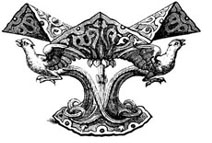
The Sixth Last Word
'IT IS FINISHED'
Caterinetta was born in 1447, the fifth and final child of James Fieschi, viceroy of Naples for King René of Anjou, and his Genoese wife, Francesca di Negro. Through her father, the girl descended from the brother of Pope Innocent IV (r. 1243-1254). From an early age, Caterinetta, or Catherine, was deeply attracted to religious life; her sister was an Augustinian canoness regular. The chaplain of the convent, however, put off 13-year-old Catherine’s request to enter on account of her youth. Shortly thereafter, Catherine’s father passed away.
Another prominent family, the opportunistic Ghibellines of Adorni, saw in Catherine a means of restoring their waning fortunes. Thus, at the age of 16, Catherine was wed to Ghibelline Julian Adorno. She was quite the catch: Besides coming from an illustrious Italian family, Catherine was beautiful, intelligent, and sensible. Julian, alternatively, was a shamefully dishonorable character, which became apparent soon after their wedding.
By his own admission, Julian was unfaithful to Catherine and rarely at home. He was a hedonist, hot-tempered, undisciplined, and profligate. For the first five years of their childless marriage, Catherine brooded in solitude. For another five, she attempted to find comfort and distraction in the merriment and recreations fitting to her station in life.
Despite the hardships of a scoundrel husband, the patient Catherine never lost her faith. On the eve of the Feast of St. Benedict in 1473, the exasperated woman begged the saint to make her sick in bed for three months. Two days later, kneeling before the chaplain at her sister’s convent, she was overcome by a piercing, mystical love for God and a recognition of her own unworthiness. She quickly made a general confession of her whole life and became a daily communicant, an uncommon practice for laypersons in the Middle Ages.
You May Also Enjoy
The scientific community holds a bias against the supernatural that is more censorial than any bias religion could have against science.
Justice is an essential ingredient of love; love is not complete unless — to switch the metaphor — it is built on a foundation for social justice.
The historical moment when Judaism seemed most alive, its pieties and devotions most ubiquitous, was the moment God required an expanded understanding and vision of His nature.

